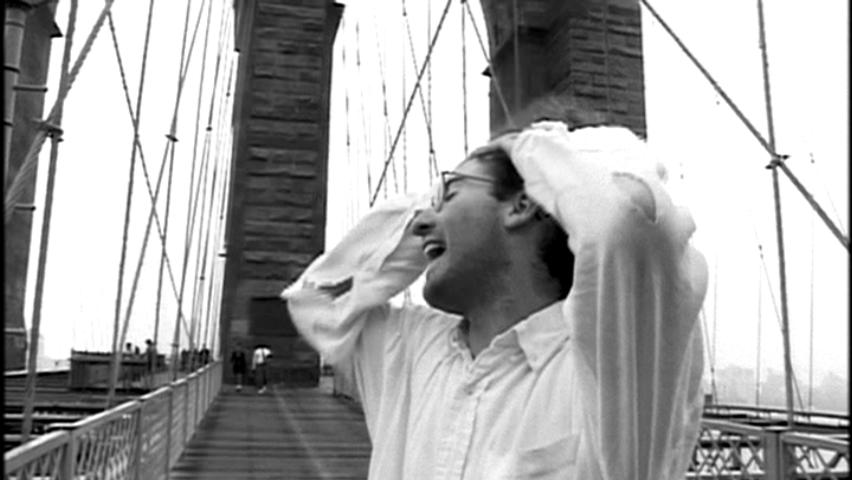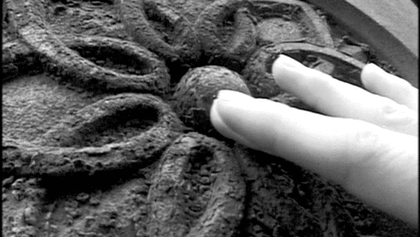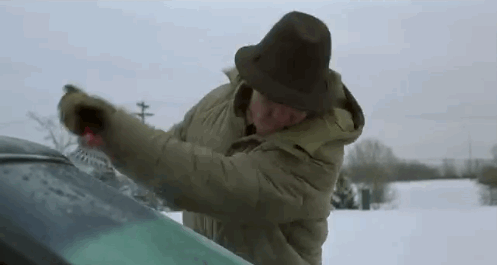Before the movie
1 How did you first come to see this movie?
This was one of those random chance happenings that perfectly suits the movie. I was flipping through cable tv and would often check out the documentary channel, because I like documentaries. And I remember the very first scene I saw of this movie. It was Speed standing on the Brooklyn Bridge talking about having a reciprocal love affair with a flower. I would come across this movie occasionally, but always at some mid point. It took me forever to get to watch it in its entirety. I remember trying to find a copy of it and requesting it through the library, and when it came in watching it every day that I had it checked out. I remember a friend in college had taped the audio and would listen to it over and over throughout the day on headphones.
2 What makes it a movie worth owning?
This movie should have been the one that made the director of Capote famous. It is not just a documentary of a New York City tour guide, it is also a documentary of New York. And the tour guide himself, Speed Levitch, is the most amazing tour guide you could only wish to have guide you. He is philosophical, poignant, narcissistic, wounded, intelligent, witty, sensitive, enraged, enlightened – all of the things that New York itself is.
3 What are your favorite parts?
There are so many great lines. His long rant about the grid system, his Brooklyn Bridge meditations, his version of “But Not for Me” bleeding into Chet Baker’s, everything.
4 What do you relate to in the movie?
I love his outlook on life. “Where there is cruise, there is an escort of anticruise,” he says. The cruise to Speed is the hidden wonders that are buried in plain sight everywhere. But then, also the notion that for every silver lining there is an accompanying grey cloud. And it is our mission as cruisers to guide our fellow travelers to focus on that which is uplifting. This is the essence behind my novel, Alien Sone.
5 Who is your favorite character and why?
Well, Speed is really the only character. He suffers but he also learns and educates and explores and discovers.
6 How did this movie make you feel?
Inspired. I wanted to go to New York and get a tour. I wanted to live my life as one long bus ride. I could watch this movie over and over and still find it fresh and fascinating.
After the movie
1 How accurate were your memories of this movie?
Really accurate. As I said, I have probably watched this movie more times than any other movie.
2 How much had you forgotten?
I forgot the moment when Speed is fondling the sculpted wall of a building. He caresses it like a lover, and his face is enraptured.
1 How did you first come to see this movie?
This was one of those random chance happenings that perfectly suits the movie. I was flipping through cable tv and would often check out the documentary channel, because I like documentaries. And I remember the very first scene I saw of this movie. It was Speed standing on the Brooklyn Bridge talking about having a reciprocal love affair with a flower. I would come across this movie occasionally, but always at some mid point. It took me forever to get to watch it in its entirety. I remember trying to find a copy of it and requesting it through the library, and when it came in watching it every day that I had it checked out. I remember a friend in college had taped the audio and would listen to it over and over throughout the day on headphones.
2 What makes it a movie worth owning?
This movie should have been the one that made the director of Capote famous. It is not just a documentary of a New York City tour guide, it is also a documentary of New York. And the tour guide himself, Speed Levitch, is the most amazing tour guide you could only wish to have guide you. He is philosophical, poignant, narcissistic, wounded, intelligent, witty, sensitive, enraged, enlightened – all of the things that New York itself is.
3 What are your favorite parts?
There are so many great lines. His long rant about the grid system, his Brooklyn Bridge meditations, his version of “But Not for Me” bleeding into Chet Baker’s, everything.
4 What do you relate to in the movie?
I love his outlook on life. “Where there is cruise, there is an escort of anticruise,” he says. The cruise to Speed is the hidden wonders that are buried in plain sight everywhere. But then, also the notion that for every silver lining there is an accompanying grey cloud. And it is our mission as cruisers to guide our fellow travelers to focus on that which is uplifting. This is the essence behind my novel, Alien Sone.
5 Who is your favorite character and why?
Well, Speed is really the only character. He suffers but he also learns and educates and explores and discovers.
6 How did this movie make you feel?
Inspired. I wanted to go to New York and get a tour. I wanted to live my life as one long bus ride. I could watch this movie over and over and still find it fresh and fascinating.
After the movie
1 How accurate were your memories of this movie?
Really accurate. As I said, I have probably watched this movie more times than any other movie.
2 How much had you forgotten?
I forgot the moment when Speed is fondling the sculpted wall of a building. He caresses it like a lover, and his face is enraptured.
3 Do you still like this movie?
You have to see this movie. But here is a clip that begs watching the whole film.
You have to see this movie. But here is a clip that begs watching the whole film.
“Oh, look. Straight up. Oh, that's a great view! The white terra cotta straight ahead. That's the one building that Louis Sullivan designed for New York City. Look at the meticulousness. And you know, that strong vertical launch in the facade is typical of the Sullivan milieu. You know, terra cotta becomes one of the major materials of New York City architecture. It's like a sand-baked brick that's not quite granite, and it's not quite brick. It kind of walks the mainstream middle. And it was excellent in New York architecture because it could hang off the skeletons of the buildings. It's much lighter than stone. The difference though between stone and terra cotta, I think with me, that strikes me the most, is that terra cotta reflects the sunlight and stone absorbs it. You can see the bouncy light along this building. When I see terra cotta like this, it just makes me feel like I'm senselessly running through a meadow, or high grassland area nude, chasing a woman I've never met before who is entirely nude. And it's just the most raw and primordial chase. Two nude human beings running through grassland and marsh area. As you move up the building, can't you feel the undulations of her curvature? The oomph, aaaah, yessss, yessss, that slight groan sometimes that some people have in the act of intercourse. It will be like ooofff, like the somewhat dying grunt of a beautiful woman grunting in the storms of her own melees. You can feel it in the meticulations of the corner signs of the terra cotta. That's why the terra cotta is important to me. It's the uuuhhh, the uuhhhh moments of life. Uuhhh! Uuuhhh! Yessss!!! Yessss! Oh, God, please! The begging parts of life. On the left, you see those like lionesque characters way up there? Please don't stop! Please don't stop!”
4 Did you have any new feelings or experiences?
I always wanted to figure out how long Speed talks about the grid plan. He starts talking about it when he sees a homeless person huddling under a comforter at what he later identifies as 34th and Broadway and keeps talking until he is standing in front of the Flatiron Building. According to Google Maps, this walk takes almost an hour.
5 What is the take-away?
It is important to search for those moments and experiences hidden and tucked into the banal routine of existence that illuminate and enhance the wonder and miracle of life. The sincere pursuit of that which is real and beautiful is more important than all of the trappings of society and civilization. And most people, even the people who were fortunate enough to go on this tour, are blind to it.
6 How do you think watching the movie impacted/ will impact your future actions if at all?
This movie is inspiring to me to seize not just the day but every moment as an opportunity to experience joy and love and mystery and magic. These are things I believe in and every time I watch it, it renews those principles. If you are open to these ideas, Speed will foster them in you. If you are closed to them, he may be like a seed in the concrete that infiltrates new life.
I always wanted to figure out how long Speed talks about the grid plan. He starts talking about it when he sees a homeless person huddling under a comforter at what he later identifies as 34th and Broadway and keeps talking until he is standing in front of the Flatiron Building. According to Google Maps, this walk takes almost an hour.
5 What is the take-away?
It is important to search for those moments and experiences hidden and tucked into the banal routine of existence that illuminate and enhance the wonder and miracle of life. The sincere pursuit of that which is real and beautiful is more important than all of the trappings of society and civilization. And most people, even the people who were fortunate enough to go on this tour, are blind to it.
6 How do you think watching the movie impacted/ will impact your future actions if at all?
This movie is inspiring to me to seize not just the day but every moment as an opportunity to experience joy and love and mystery and magic. These are things I believe in and every time I watch it, it renews those principles. If you are open to these ideas, Speed will foster them in you. If you are closed to them, he may be like a seed in the concrete that infiltrates new life.



 RSS Feed
RSS Feed
